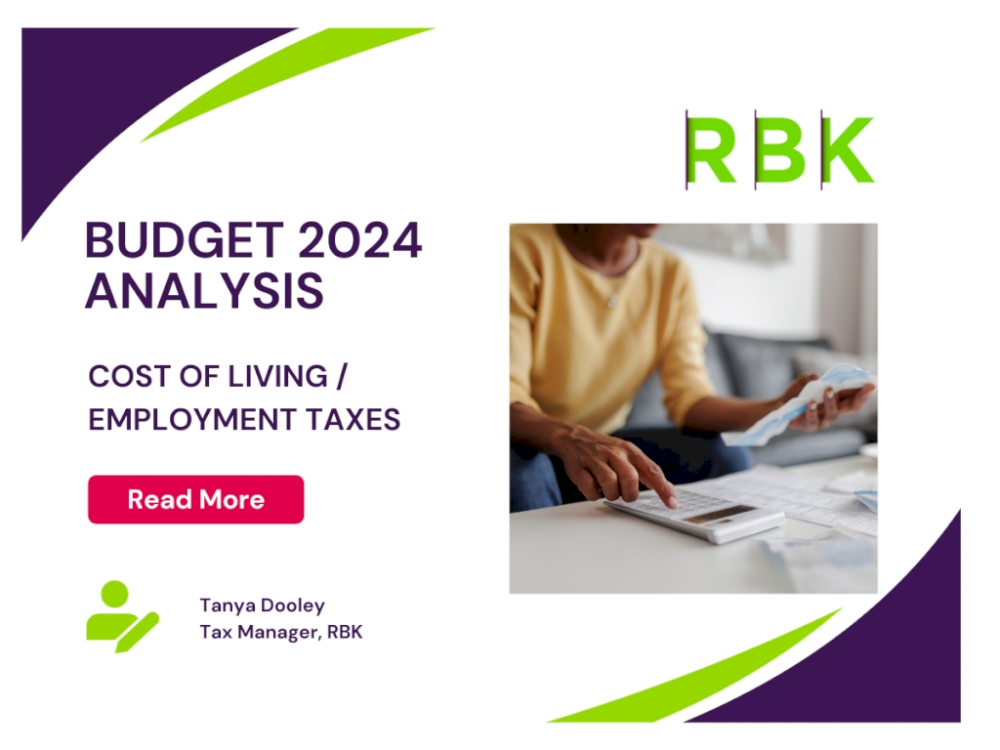We can expect this year’s Budget to contain a significant ‘cost of living’ package however we expect it will not be to the same scale as last year’s measures. Any measures implemented to assist businesses with attracting and retaining talent in Ireland will be welcome. In recent years with an increase in remote working, some roles can be carried out anywhere in the world and it is important for the Government to ensure Ireland remains a competitive environment to carry out business for employers and their employees.
Income Tax
As outlined by my colleague Michael Smith, the personal tax system in Ireland can be overly complicated and employers will welcome any widening of the standard rate income tax band which will increase the net take home for the average employee. As per the CSO, the average weekly earnings in Q2 2023 were €909.77, bringing the average annual salary to c. €47,200. Ideally the average employee would not be subject to the marginal rate of tax at 40% which is currently entered into at €40,000.
We expect to also see some widening of the USC bands or a change in rate which will also increase the employee’s net take home pay.
PRSI
It has been well documented that Ireland’s social security system will face funding challenges in the future due to our aging population. While Ireland’s employee and employer contribution rates remain some of the lowest in Europe any increase on the employer contribution would put more strain on the increasing operating costs for businesses especially for Small and Medium Enterprises (SME’s) who employ over 1 million people in Ireland. Any increase in the employee rate will also counteract any benefit of the income tax measures expected in the Budget.
While there is no indication we will see any change in this year’s budget, to ensure the system is fit for purpose an overhaul to the system and simplification would be more welcome than any increase or movement in rates.
Special Assignee Relief Programme (SARP)
Last year’s Budget confirmed SARP relief has been extended to 31 December 2025 with the minimum income limit for new entrants increasing from €75,000 to €100,000. The programme was designed to encourage employers to relocate their top talent to Ireland and provides tax relief for these employees for 5 years.
Any extension to the relief brought forward in this year’s budget would be well received by employers trying to attract talent into Ireland to ensure our personal tax system is competitive with other countries in Europe.
Equity
The current system in place for reporting of share options and Employee Share Purchase Plan (ESPPs) remains overly complicated and the obligation falls to the individual to pay and file the Form RTSO1 within 30 days of an exercise while the employer is required to submit an annual return outlining the relevant details for grants or exercises in the year by the 31 st March following the end of the tax year.
We are aware this is an area of increased Revenue scrutiny in recent months and both employers and their employees have been contacted by Revenue querying share based transactions reported on or absent from their tax returns.
Restricted Stock Units (RSUs) however are operated and taxed via the payroll system which reduces the complexity for both the employer and their employees and we would like to see the complexity reduced for other forms of share based remuneration by reporting the transactions via Irish payroll. By removing this requirement, the standard employee who receives share based remuneration would no longer be a chargeable person who is required to file a Form 11 each year which again reduces the burden on the employee.
Other Measures
As well as attracting talent into Ireland, employers are also focused on retaining staff in light of the increasing costs of living and constraints on the housing supply.
The rent tax credit of €500 introduced in last year’s budget was a welcome introduction and we can expect to see this replicated in this year’s budget with a potential increase in the credit available. The Taoiseach has also indicated some relief for mortgage interest may be announced on Tuesday for homeowners suffering high interest rates.
Last year’s fuel credits were also well received measures to assist with the increasingly expensive costs incurred by households. While we do not expect to see the same level of credits which were previously provided there may be some support announced on Tuesday which will take into account the recent price cuts reported by energy companies.
RBK will be holding its annual Breakfast Budget Briefing as a hybrid event in person at the Shamrock Lodge Hotel in Athlone and streaming live online on Wednesday 11th October. Mike Scanlan, Senior Tax Manager, RBK will be analysing the tax measures announced in Budget 2024 and Oliver Mangan, Chief Economist with AIB will look at the economic outlook. In the lead up to the Budget, RBK’s Business and Tax advisors will look at potential tax measures that the Government could consider and areas of concerns that are facing our clients.
Contact Us:
Should you wish to discuss any aspect of Employment Taxes, please contact our team:
Tanya Dooley +353 (0)1 6440100
Ronan McGivern +353 (0)1 6440100


